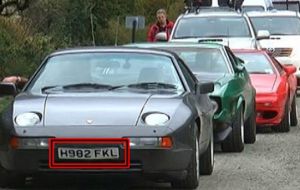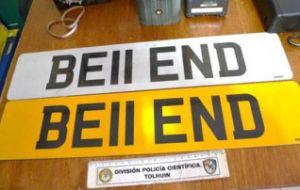MercoPress. South Atlantic News Agency
Argentina claims BBC Top Gear had three different plates and planned to set the cars on fire
 Clarkson's Porsche '91 with the controversial plate that triggered incidents
Clarkson's Porsche '91 with the controversial plate that triggered incidents The BBC Top Gear team which last October toured Argentina with three vehicles and which triggered a strong controversy apparently had three different plates in just one car and tried to torch the vehicles to cause further 'scandal', according to reports from the Patagonian police which were attached to a second letter sent by Argentine ambassador Alicia Castro to the BBC Executive Board.
Ms Castro insists that the head of Top Gear team Jeremy Clarkson is not saying the truth when he argued that the plate “H982 FKL” which triggered incidents in reference to the Falklands 1982 conflict, was a 'mere coincidence' since when leaving the ski center Cerro Castor, Mr Clarkson's car plate number was “H1 VAE”.
Under the British registry the car with the plate H982 FKL was that belonging to Clarkson most of the tour in Argentina but the H1 VAE belongs to another vehicle that was not part of the Top Gear team in Tierra del Fuego, points out Ms Castro in her letter to Rona Fairhead.
Likewise according to the police report from Tolhuin a third plate 'BEII END' was found in one the vehicles abandoned by Top Gear. The police report also states that the team led by Mr. Clarkson had the intention of setting the three sports car on fire on their way to Chile, but were prevented by the officers who also asked the British not to abandon their cars, “but that was ignored and the police had no alternative but to take them under custody”.
Follows the letter to the BBC Executive Board
To whom it may concern,
Mrs. Rona Fairhead, the Chair of the BBC Trust, has informed us in a letter of 4 December that the Trust cannot consider a complaint before it has gone through a formal process with the BBC Executive and that, 'in the first instance, the Director of Television would like to send you a further reply to your initial letter”.
I am therefore writing this letter -in addition to my complaint of 20 October- in order to help the Executive Board and particularly the Director of Television Mr Danny Cohen, to make a more informed judgement on the offensive behaviour of the BBC Top Gear team in Argentina and the subsequent account of the filming given by Mr Clarkson in his Sunday Times article of 5 October. The question is whether this behaviour complies with BBC’s Editorial Guidelines which state that, when working abroad, BBC Staff should be “...open about our intentions when entering countries to work”. Further, the Editorial Guidelines state that there is a responsibility to “avoid unjustifiable offence”.
We believe that Top Gear's provocative behaviour in Argentina and Mr Clarkson's offensive comments - speaking as a BBC employee on the filming of a BBC programme - about the Government of Tierra del Fuego, fall well below the BBC's Editorial Guidelines.
As is well known, Clarkson arrived in Tierra del Fuego, just 400 miles from the Malvinas Islands, flaunting a car with the number plates “H982 FKL”, evoking the year and the initials of the territory in which the war took place. The conflict in the South Atlantic - and especially the memory or those who lost their lives in the war on both sides- deserves to be treated not with malicious mockery, but with understanding and respect.
Mr. Clarkson claims that this number plate was a “mere coincidence” and that there was no intention to be provocative. In his letter of the 30th of October 2014, the Director of BBC Television, Danny Cohen, merely reassures us that Clarkson’s version of the events is correct.
I attach a report from the Secretary of Institutional Affairs in response to the defamatory accusations made by Mr Clarkson with regard to the Government of Tierra del Fuego. Because the BBC has not made a formal apology and, instead, is intent on screening the programme, the Tierra del Fuego Government is considering taking legal action.
I also attach the official report from the Police Commission in Tierra del Fuego (together with an unofficial translation) which contains a detailed account of the security measures and resources put in place by the provincial authorities in order to guarantee the security and safe passage to Chile of the members of the Top Gear crew. This gives the lie to Jeremy Clarkson’s remarks in the Suday Timesnd (5 October) and in other media outlets that the Top Gear team was ”ambushed” by the provincial authorities, and that they “sent the English packing” in order to win favour in an upcoming election.
This report certifies that by 2 October, when preparing to leave the Cerro Castor ski resort, Mr Clarkson’s car (a Porsche, year 1991, colour grey) displayed number plate H1 VAE. According to the DVLA registry, the number assigned to that car is H982 FKL, which had indeed been fitted to the car during most part of its journey through Argentina. Registration H1 VAE is assigned to a different car (a Porsche, year 2006, colour white) which was not part of the Top Gear team in Tierra del Fuego. Furthermore, we know from Tolhuin’s Police Department that a third set of registration plates (BEII END) was later found inside one of the cars after it was abandoned (See attached images of the car displaying two different plates and of the third set of plates found by the police).
The report also informs us of the Top Gear team’s intention to set the three sports cars on fire on their way to the border with Chile. This alarming and illegal intended act was prevented by the police authorities. They also advised the crew members against abandoning the cars, who ignored their advice. The authorities therefore were left with no alternative but to impound the cars.
This raises at least two relevant questions:
1) How, if this is an ‘innocent’ coincidence, as argued by Mr Clarkson (and tacitly supported by the Director of BBC TV Mr. Danny Cohen), can one explain the presence of two other sets of registration plates for the same Top Gear car while in Patagonia? What was the purpose of having three sets of plates - one offensive, one 'innocent' and one scatological in a most puerile way - if not to make mischief and then attempt to cover up this behaviour?
As the BBC Executive Board also surely knows, changing a car’s registered plates is a criminal offence both in Argentina and in the UK.
2) Regardless of the fact that both attempting to set the cars on fire and abandoning them by the side of the road may amount to criminal offences, why would the team possibly want to burn such expensive BBC property?
As the reports from Argentina that I have attached clearly indicate, when local people spontaneously gathered to demonstrate against the Top Gear film crew, the local authorities immediately intervened to guarantee the safety of all members of the British team, securing means of transport, seats on a flight to Buenos Aires and a special arrangement to cross the border to Chile.
In his account in The Sunday Times (5 October) - in order to portray Argentines as savages and without acknowledging the security extended to him by the Government of Tierra del Fuego - Clarkson reflects on what might have caused the protests. He reasons that the troubles were in no way linked to his provocative behaviour, but were in fact down to other causes: “We were English...”, he concludes.
He seemingly overlooks the fact that there are 250,000 British and descendants of British people living happily in Argentina, and enjoying the respect and friendship of Argentine society as a whole. He pretends to be unaware of the fact that in the very same Argentine Patagonia, just a few miles from where he was, there is a community of 70,000 Welsh people.
In order to insult our people, he remains silent about the fact that there is a record of excellent cooperation between the BBC and Argentina, with the BBC's “Walking Giants” and “ BBC Patagonia” being only the most recent examples of production teams that have been enjoying the friendship of the Argentine people and the full cooperation of the Tierra del Fuego Government.
We have - as I showed Mr. Cohen in my brief meeting with him- many letters of support from British citizens, including MPs, who consider Jeremy Clarkson an “embarrassment” and are indeed very unhappy to pay their taxes towards funding a BBC presenter dedicated to insulting foreign countries as Jeremy Clarkson has done with, amongst others, Mexico, India, and this time, Argentina.
We read that BBC is planning to broadcast this show as Top Gear Christmas Special. We have also heard from many sources that the only reason why the BBC could possibly tolerate Clarkson's behaviour is due to the considerable revenues that the BBC receives from his programmes. Perhaps the Executive might wish to share our thought that there are still some values more important than money and revenues: one of them being the international prestige of the BBC.
We are confident that these new findings will help the BBC Executive Board to give reasoned consideration to our complaint, as well as determine whether Mr. Clarkson’s behaviour, and that of his team, falls below the BBC Editorial Guidelines.
Yours sincerely, Alicia Castro, Ambassador





Top Comments
Disclaimer & comment rules-

-

-

Read all commentsWhat about the stunt they pulled with the, so called athlete, in the Falklands just prior to the London Olympics? To compete on UK soil, we train on Argentine soil but lose on everyone's soil.
Dec 08th, 2014 - 08:59 am 0At worst this is just tit for tat, but they sure don't like it when it's reciprocated.
This from the woman who claims the Falklands War (technically an armed conflict), STARTED with the sinking of the Belgrano.
Dec 08th, 2014 - 09:04 am 0All seems a bit contrived so as to deliberately take offence.
Dec 08th, 2014 - 09:04 am 0Growing awareness in UK that the Argentinian people and police behaved like animals and only the intervention of a few Chilian Border Guards prevented a serious crime taking place.
Commenting for this story is now closed.
If you have a Facebook account, become a fan and comment on our Facebook Page!